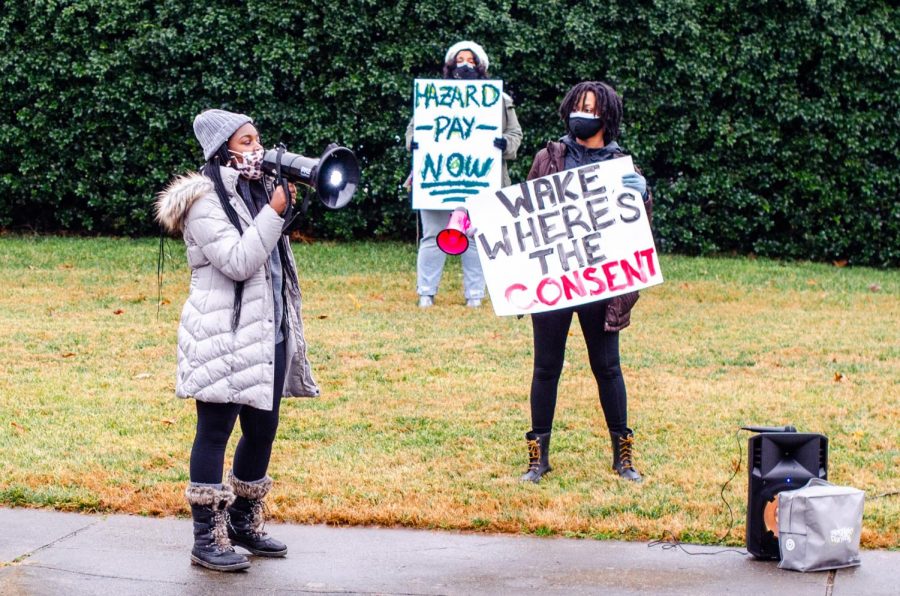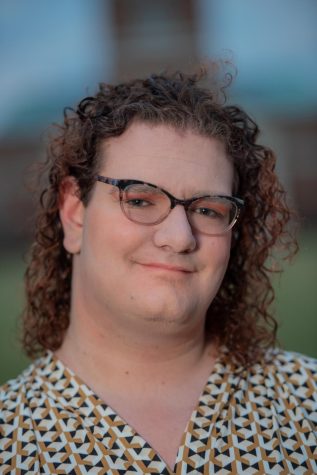Group forms to address RA concerns
Following last month’s protest, administrators seek to improve working conditions for RAs
RA Rue Cooper, who now serves as a member of the action group, speaks at a Feb. 2021 protest. Cooper helped organize the protest last month that brought RA working conditions into the spotlight as a campus-wide issue.
March 11, 2021
In the wake of a spike in COVID-19 cases and mounting anxiety over the university’s quarantine policy last month, communication between resident advisers (RAs) and the administration reached a boiling point. This frustration culminated in RAs and other concerned students launching a protest aimed at the administration. Following that critical point, the administration, led by Vice President for Diversity and Inclusion Jose Villalba, put together an action group to evaluate how the university can more effectively communicate with RAs and create a better environment for them.
The resulting RA Concerns Action Group, which is chaired by Villalba, consists of multiple student and administration stakeholders, convened for the first time on Feb. 22.
The group’s members consist of RA Rue Cooper (who helped organize the protest last month) and Presidential Fellow Isabella Ryan; one professor, two assistant deans (Jim Settle of student conduct and Shonda Jones of the divinity school), and two administrators, Stephanie Carter from Residence Life and Housing and Laura Giovanelli from the Office of the Dean of the College. The Old Gold & Black reached out to Cooper for comment, but could not immediately reach her.
“The group … will meet for the next four-to-six weeks, [we will focus] on coming up with (a) clarity on what actions have already been taken to address the needs and lived experiences of RAs at Wake,” Villalba wrote to members of the group in an email obtained by the Old Gold & Black. “And (b) direction for what actions are yet to be taken and how the institution might carry those out.”
The action group’s main task will be to sift through accounts of RA experiences with the university’s COVID-19 policy (as well as other, longer-standing issues) in order to create a clear action plan, as Villalba mentioned in his introductory email. Villalba reached out to RAs on Feb. 24 to solicit feedback and invited those with concerns to meet with him.
“For those of you that have been RAs for three years, I know many of these experiences and concerns are not new for you; you’ve grappled with them for some time. And I’m also aware that some of you have engaged in discussions already with others on campus, such as Carter, [Dean of Residence Life and Housing Matt] Clifford, and [Vice President for Campus Life Penny] Rue,” wrote Villalba in the Feb. 24 email, a copy of which was obtained by the Old Gold & Black. “The group I’m chairing will build on those discussions, [we will be] planning a path forward that builds on what you’ve already articulated and [exploring] multiple options for improving your experiences, and that of your residents.”
According to an email blurb sent out to action group members, the gathering of feedback went successfully.
“Thanks to [Carter’s] work with Matt Clifford and Penny Rue,” the email reads. “There is lots of awareness for what RAs are experiencing, in relation to COVID-19 and beyond.”
According to multiple RAs, there has been no follow-up communication about the group’s work beyond the initial email.
Residence Life and Housing has continued to work on addressing the immediate concerns of RAs. As of now, COVID-19 cases on campus have dropped and the need for quarantine-in-place has disappeared, which solves one part of the problem. In terms of hazard pay, which was a main concern of RAs at the protest, those discussions were in the works but did not result in any pay raise beyond a $150 bonus, which, according to Clifford, was already planned before the protest.
With COVID-19 nightmare spikes (hopefully) behind Wake Forest, the action group is now looking beyond the horizon of COVID-19.
“There are long-term concerns that can be addressed,” Villalba said. “This group is committed to providing clarity on what additional resources and directions are needed to improve the experience of RAs on campus.”
The group’s work is slated to end between late-March and mid-April, and it remains to be seen which policy the action group will endorse. However, the university seems to be answering the demand for a listening ear.























